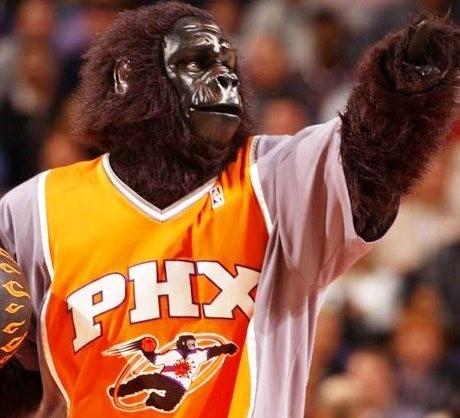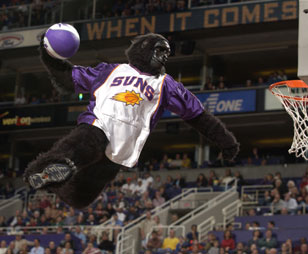Last February I took my Dad to a Phoenix Suns game. We had a great time even though the Chicago Bulls weren’t the toughest opponent. When you go to a game with your Dad, it doesn’t really matter who’s playing.
Early in the 2nd quarter, a young family showed up to occupy the empty seats next to us. A Mom and a Dad, and a daughter and a son, who appeared to be about 8 years old. Outward indications were that he had a slight degree of Down’s Syndrome. He watched the basketball players intently but during the timeouts he was standing on his seat, straining to see the Sun’s mascot, “The Gorilla”.
 “The Gorilla” is a superb entertainer. Actor, gymnast, and clown all wrapped up in a furry black suit. The job is not without a degree of danger. Last year the Gorilla broke his ankle when he landed wrong from a trampoline slam dunk. Even with a walking cast, he still showed up to make people smile.
“The Gorilla” is a superb entertainer. Actor, gymnast, and clown all wrapped up in a furry black suit. The job is not without a degree of danger. Last year the Gorilla broke his ankle when he landed wrong from a trampoline slam dunk. Even with a walking cast, he still showed up to make people smile.
The Gorilla is everywhere during a game. Sometimes throwing out boxes of pizza to a lucky section of fans. Sometimes firing t-shirts into the crowd with an air cannon. And sometimes just making the rounds with his primate personality.
During a break in the action in the 4th quarter, the Gorilla made his way into the stands. He ran up the stairs in our direction and after a couple monkey hops over handrails it was clear that he was headed straight for us. The little boy was beside himself. The Gorilla was now only a couple rows away. He high fived a grown-up or two, then bounded over the rail in front of us. The little boy could not believe his good fortune. He just looked up, wide-eyed, mouth open. The Gorilla rubbed him on the head, did a little dance and headed back toward the court.
About five rows down, the Gorilla made an abrupt about-face and came back. He did a two-hand vault over the handrail and stuck the landing right in front of the little boy, who was now dancing like a runaway fire hose. The two of them exchanged hand slaps and a friendly push and shove before the Gorilla reached into the pockets of his Suns warm-up jersey and handed the boy some souvenirs. He took half a step back and it was all the opening the little guy needed. He laid a giant hug on Gorilla, a hug that was returned with enthusiasm. One more high-five and he was gone, bouncing and jumping back to court side. 
I did a quick scan of the row behind me and discovered I wasn’t the only one with a tear in my eye. The boy announced to everyone, “I know him. He comes to my hospital.” The way he put a first-person pronoun in front of “hospital” told me that hospital was a regular part of his routine.
We came to America West Arena to watch a professional basketball game. What I got was a graduate level lesson in communication. The Gorilla never speaks. Yet he is a highly skilled communicator. A master of body language. The tilt of the head, the motion of the hands, the shrug of his shoulders, the bounce in his step. How would you communicate to 15,000 people if you couldn’t speak?
Often we struggle to find the right words to express our thoughts, our feelings, our emotions. Choice words, well-spoken are a treasure, both to speak and to hear. But because we’re fallible human beings, we sometimes don’t choose our words carefully. We blurt out or spit out words we wish we could retract. And what do we use to repair words ill spoken? More words. Using more words to fix words ill spoken is not unlike changing the answer on a test question to which you don’t know the answer. You cut your chances in half again of being right. It doesn’t take long before we’re drowning in our own verbiage.
If communication is 90% non-verbal, how would it be if we tried communicating more by speaking less?
Somewhere in the valley there’s a little boy who considers The Phoenix Suns Gorilla his friend. In a brief moment, a team mascot made this kid feel welcome, excited, important, special, the center of attention and loved.
All without a word.
“Words from a wise man’s mouth are gracious, but a fool is consumed by his own lips. At the beginning his words are folly; at the end they are wicked madness–and the fool multiplies words.”
– Ecclesiastes 10:13-14
Todd A. Thompson – January 15, 2002

